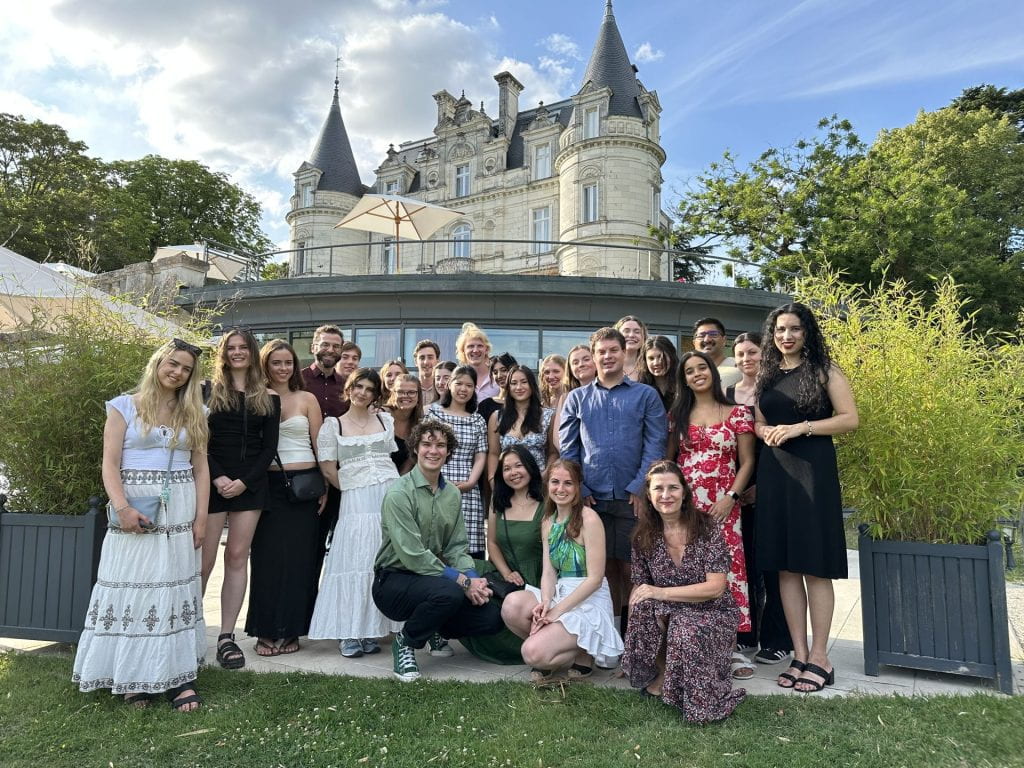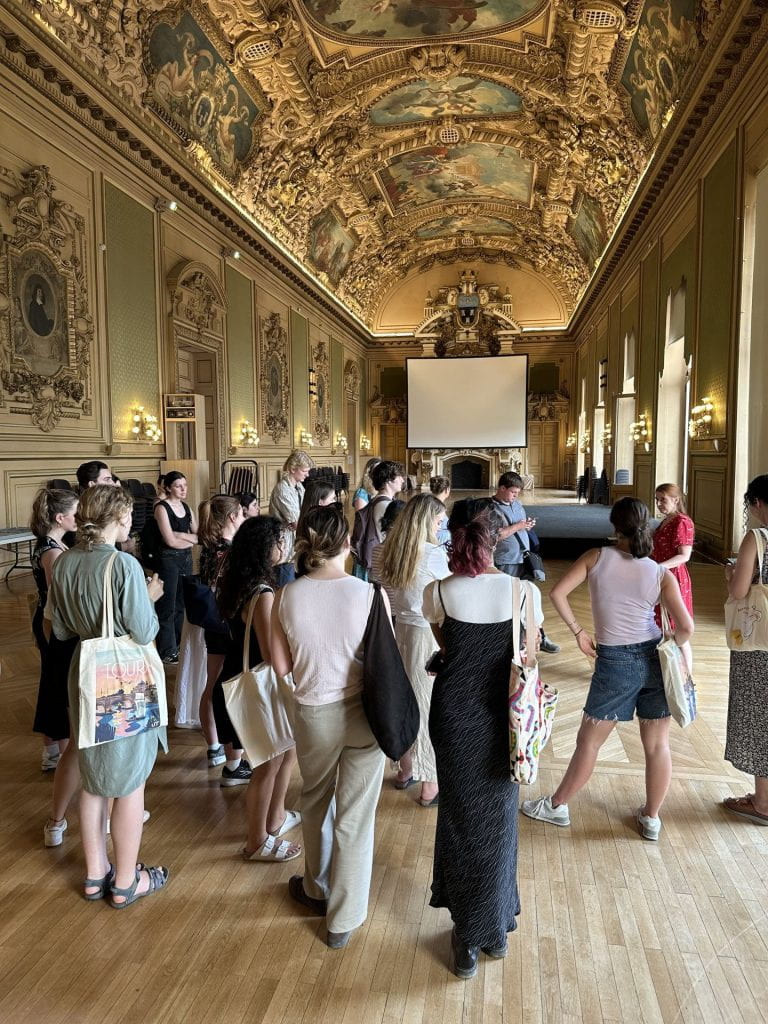
In the Heart of Loire Valley: an Interview with the Coordinators for an Immersive Overseas French Studies Subject
Rena Gao
Prof Véronique Duché and Dr Nicholas Strole of the French Studies Program guided students through a three-week intensive trip to the Loire Valley for an immersive experience, focusing particularly on the French Renaissance. Rena speaks to Véronique and Nick about the subject, In the Heart of the Loire Valley, and the students’ experiences during the trip.
***
First of all, thank you for speaking with me. Would you two like to tell us more about your research interests or teaching experience?
Véronique: My research expertise is in Renaissance studies and translation studies.
Nick: I work on contemporary French theatre, migration, post-colonial studies, and translation. I also direct a theatre troupe in French at the University.
What led you to develop this subject?
Véronique: In Australia, students would find it very difficult to study literature from the French Renaissance written in Middle French so I thought that to make this accessible to students, we should go to France and immerse ourselves in the region. By living in the region, visiting the castles, museums, exhibitions or other cultural institutions, the students can better understand this period of French history and the stories surrounding it.
Nick: As for every subject we have in the French Program, this subject focuses on French culture and language. It’s not only about the French Renaissance but how we’re training students to be able to analyse the French Renaissance and compare it to contemporary French culture, as well as to life in Australia.

***
Could you share more about the selection process and format for this subject?
Nick: We’re focusing on a very complex period of French history, so the students need to have a certain level of French. But we also want to make sure they can work together, fit into the group, and interact with their peers. This is more of a breadth subject for many of the students and so it’s really interesting to see how students come together from a variety of disciplines, for instance, microbiology, sciences, commerce, economics, just to name a few.

Véronique: This past year, we had a group of 25 students who came to the Loire Valley in France for three weeks and all lived together in a residence hall at the Université de Tours. It was an immersion subject where we encouraged the students to speak French the whole time and interact as much as possible with native French speakers.
We organised several guided tours and we also encouraged the students to explore the region during the weekend so they visited other places or even other countries in Europe. One student even joined a rowing team in France, just to experience the difference between French and Australian cultures.
Nick: Half of the subject is in the classroom where Véronique provides background history on the different castles that we are going to visit while I work with the students on French language and culture in general. And then half of the classes are excursions to different castles or historical monuments.
Véronique: We also had different cultural activities as well: wine tasting, cheese tasting, and a Renaissance dance class, which was a surprise to the students. And that was a way they were able to immerse themselves in the culture of the time, in the history of the Renaissance, because dance was an important element of social life, being it in the villages or at court. We also invited guest lecturers from the Université de Tours.
What are some major takeaways for students after they have completed this subject?
Véronique: For students, the guest lectures were very interesting because the lectures in France are not given the same way they are in Australia. So the students also have to learn how to adapt to a new education system. But they did very well and they were interested and asked questions.
Nick: I think the students were really proud of themselves when they got out of the lecture and said: “I actually understood most of it!”
Even though the subject was only three weeks long, we noticed that the students gained a considerable amount of confidence in their French-speaking skills by the end of the subject.
***
What were some challenges you think the students encountered and how did they overcome them?
Nick: In order to help students overcome certain difficulties they might have in France, I developed a workshop on cultural differences. For example, the pharmacy is very different in France. Most things are behind the counter at the pharmacy and you have to go to the pharmacist and tell them what your specific problem is and they will go get whatever you need.
This is why at the beginning of the subject I led this workshop on cultural differences to let the students know what they needed to do when they approached a French speaker, whether it’s a bakery or pharmacy or the supermarket. Because there’s a very specific way native speakers respond in these contexts and it always throws students off. If a student hears something that they’re not expecting, I think their brain sort of shuts down and they switch to English. So I told them to listen for specific phrases when they go to a restaurant, bakery, a pharmacy, or a local store or market. My goal in that workshop was to give students the tools they needed to interact positively with the local population during their time in France.

***
What benefits do you think this subject can bring to language students?
Véronique: In this subject, we designed three assessments to encourage students to develop a deeper understanding of Renaissance France and to experience the local culture.
The first assessment was a journal that they kept where they wrote about their reactions to or reflections on the different excursions in the Loire Valley. Some of them got really creative on that assessment.
For their second assessment, they each created a video presentation, which they filmed in the castles we visited. Many students used this as an opportunity to take these videos back with them as a souvenir of their experience. Lastly, they had a final project where they could be more creative and create a brochure for an imaginary castle. In this project, they took elements from all of the castles they visited and brought them together to create a brochure. This allowed them to be creative as they advertised their castle and educated the general public on its historical significance, using all the knowledge that they learned throughout the three-week intensive. The main goal of this subject was to encourage the students to learn in a hands-on way by visiting the castles and experiencing what it was like to live in 16th-century France.
Nick: By the end of the intensive subject, I got the impression that the students felt like they truly adapted to life in France. When it was time to leave the residence hall, many of the students said, “I don’t want to leave. I want to move here, I want to live and work here!”. I am sure many of the students from the subject will find ways to go back to France after graduating from the University of Melbourne, and will continue their studies at a French university or even start a career in France or a French-speaking country.
***
Thank you for speaking with me, Véronique and Nick!
Thank you, Rena.